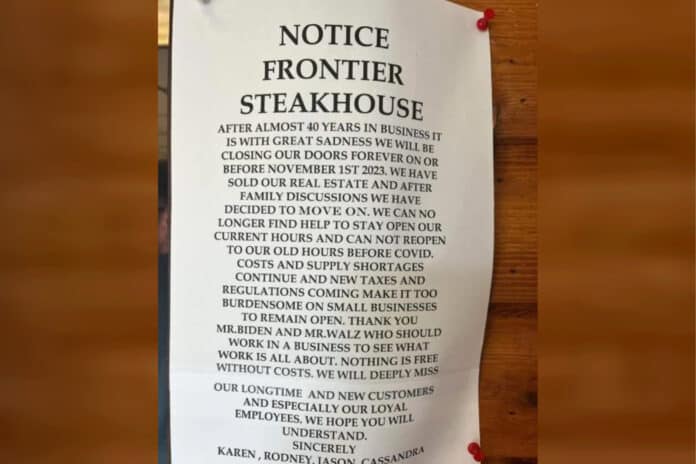
A Princeton, Minn., restaurant announced it is closing after 40 years, citing “burdensome” new taxes and regulations.
“We can no longer find help to stay open [under] our current hours and cannot reopen to our old hours before COVID,” reads a notice posted at Frontier Steakhouse. “Costs and supply shortages continue and new taxes and regulations coming make it too burdensome on small businesses to remain open.”
The restaurant confirmed with Alpha News that it will be closing its doors sometime before November.
“Thank you Mr. Biden and Mr. Walz, who should work in a small business to see what work is all about,” the Anderson family owners wrote in the notice. “Nothing is free without costs.”
Big Apple Cigar & Pipe based in Forest Lake also recently announced its closure in an online letter. “The MN government is pathetic, incompetent, and abusive to its constituents,” a letter posted by the business says.
A recent report by CNBC declared Minnesota one of the best states in the country for small businesses. Rep. Walter Hudson, R-Albertville, responded to the ranking on Twitter, calling it “laughable.”
When CNBC put out their laughable ranking, claiming Minnesota is more business friendly than Texas, they scored things like this positively instead of negatively. They supposed that business will flock to states where their development will be stifled.
Guess we'll see. https://t.co/XizSIoOe61
— Walter Hudson (@WalterHudson) July 25, 2023
Hudson criticized CNBC’s ranking for considering things such as environmental quality.
Minnesota was ranked fifth on the report, coming in behind North Carolina, Virginia, Tennessee, and Georgia. One of the categories considered in the report was “Life, Health & Inclusion,” which looked at things like “environmental quality,” voting rights, and abortion laws. That category accounted for up to 14% of each state’s score.
Jerrilynn and Pat Sweeney, owners of Innovated Building Concepts, can relate to the Anderson family. They told Fox News that Minnesota’s new paid family and medical leave law, which will be funded by a new 0.7% payroll tax and caps benefits at 20 weeks per year, could force them to close.
“Right now we try to work with our employees and give them as much time as they need,” Jerrilynn said. “We tried to incorporate a generous PTO policy to help with that, too. But … if it’s 20 weeks, and they can say 12 weeks for one issue and back to back, say ten weeks for another, it’s just crazy.”
















